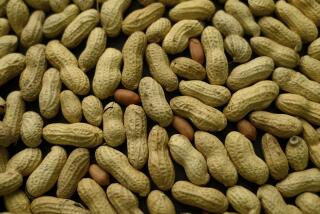When babies eat first gluten doesn’t change chance of celiac disease, study says
- Share via
Parents with celiac disease often jump through hoops over breastfeeding and when to give children their first bread or other food containing gluten, but a study published Wednesday suggests it doesn’t matter much in terms of whether the child will develop celiac disease.
However, delaying the first taste of wheat, barley or rye in infants who are at risk of celiac disease could delay the age at which they get it, and that could mean they’re healthier during those phases, according to one of two studies about gluten and celiac disease published in the New England Journal of Medicine.
------------
FOR THE RECORD
An earlier version of this post said Levy was diagnosed 40 years ago. She was diagnosed 30 years ago.
------------
“These are very important studies, very wonderful studies” involving many children in randomized trials, said Dr. Peter Green, who wrote an editorial about them in the journal. They should provide relief for many parents, said Green, director of the Celiac Disease Center at Columbia University.
“The question comes up from parents who are asking, ‘How can I prevent my child from getting celiac disease?’ These studies address that,” Green said.
The results should be a relief for “people who think they did something wrong, or were not able to breastfeed.... It doesn’t make any difference in whether you get celiac or not,” Green said. And, he wrote in his editorial, “From now on, it will be hard for anyone to continue to recommend the introduction of gluten specifically at the age of 4 to 6 months.”
Amy Levy is a Los Angeles parent of a 7-year-old who was diagnosed with celiac disease just before her sixth birthday. But, Levy said, “My concern about her digestive health began even before she was born.”
Levy has not been diagnosed with celiac, but was diagnosed with ulcerative colitis 30 years ago and suspects she has a gluten problem. The study, she says, is “a huge relief to parents.”
She breastfed her daughter, believing she was contributing to her health, and was later distressed at the idea that “celiac could pass through the breast milk.... To hear that it didn’t make it worse, it’s a comfort.”
Gluten-free diets are the only treatment at present for people who have celiac disease, estimated to be about 1 in 133 people in the United States but as many as 10% among those with a parent with the disease. Sufferers become very ill if they eat even a tiny bit of gluten – by, for instance, using a toaster that had wheat bread in it.
Other people – estimates range as high as 1 in 3 – try to avoid eating foods with gluten for reasons such as intolerance, which has come to be called “non-celiac gluten sensitivity,” and the popularity of gluten-free diets for weight loss.
In one of the studies, scientists in Italy randomly assigned 832 newborns who had a parent or sibling with celiac disease to either first eat gluten at 6 months or at 12 months. They were followed for 10 years. The study was done by a group of researchers from several Italian and U.S. institutions.
The scientists from that study, and the second study – of children from several countries -- also monitored breastfeeding. Both concluded that breastfeeding did not affect development of celiac disease.
A high-risk genotype was an important predictor of the disease; Mutations in the protein human leukocyte antigen may be linked to autoimmune diseases including celiac.
“We had been advising a little bit of gluten at 4 to 6 months,” which was considered a window of opportunity, with the idea that a small amount of an allergen would make the child better able to develop protective responses, Green said. But the study concluded that “it didn’t make any difference,” he said.
That practice had developed from an epidemic of celiac disease in Sweden in the 1980s and ‘90s.
Although postponing the introduction of gluten to 12 months did not affect development of celiac disease, the researchers said it had two positive consequences. First, it delayed onset of the disease; second it slightly reduced the prevalence of celiac disease autoimmunity among children with a high-risk genotype.
In the second study, some high-risk infants were given gluten and others were given a placebo at 4 to 6 months; the study concluded there was no difference in developing celiac disease.
Parents might feel frustrated that there’s not much they can do to keep children from developing the disease, Green acknowledged.
“Celiac disease is increasing and we don’t know why,” he said. In his editorial, he noted, the two studies “are at the beginning rather than the end of research in this field.”





